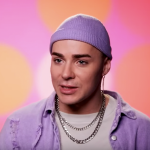 |
| Jamie Brickhouse |
As an openly gay and HIV-positive man, I never thought I’d have anything in common with Charlie Sheen. As his HIV story went viral, so to speak, it was his admission that he paid millions of dollars to several individuals to keep his HIV status secret that struck a nerve of identification with me. It appears that he let himself be blackmailed because of the shame and stigma that still surrounds HIV. I get that.
No one extorted millions from me, but it was blackmail—emotional blackmail—that pushed me out of the HIV closet.
In 2012 I had been positive for 10 years (one pill a day, undetectable, healthy), and the only people who knew were my common-law husband (negative), a handful of close friends, and sexual partners. I was in the closet to the rest of my friends, certainly my professional colleagues, and definitely to my family. My parents were the main people whom I didn’t want to know. They were conservative but had always loved me unconditionally and had known I was gay since I was 18. I didn’t want them to know—so I told myself—because I didn’t want them to worry.
I could have explained to them what I knew was true through my experience: that HIV hasn’t been a death sentence for a long time and that I will eventually die, but probably not from HIV. Despite that present truth about HIV in the United States, it’s still in the “gasp” category of diseases, as in folks gasp (if not out loud, than silently) when they hear that someone is positive. HIV is still seen as the worst thing to have. Of course, the other gasp inducer is how it’s contracted (sex or intravenous drug use). I contracted it through anal sex. Does Sheen really not know how he contracted it, as he claims, or is that the last frontier of shame he doesn’t want to cross publicly?
HIV is still different from most diseases about which we talk openly, such as diabetes or cancer. The reason, I think, is because one catches HIV from being human, and to too many humans, being human is shameful.
The real reason I didn’t want my parents to know was shame—mine and theirs. If I’d had a manageable disease like diabetes, would I have kept it from my parents because I didn’t want them to worry? I don’t think so. Would I have kept that even from my friends and co-workers? No. Shame is a fraternal twin to fear, and when they join forces, they can leave a person open to attack.
I think my mother went to her grave without ever knowing, although she suspected and even asked me once. I lied and told her no, but can one every successfully lie to your mother about the big stuff? My mother’s death left more room for my father and me to grow even closer—and we did—but I was still hoping I’d never have to tell him.
In 2012, a family member and I had a serious falling out. This person, who knew about my HIV status, retaliated by leaving me this voicemail message: “I may have not told your mom about your HIV condition, but I’m sure going to tell your dad. How do you think he’s going to react to that? I’m sure you’ll know soon enough after I tell him.” The words were fueled by white-hot anger, but the venom used was shame, fear and intimidation: emotional blackmail.
My immediate reaction was melodramatic. I walked around my apartment in circles running my hands through my hair in a panic that he would deliver on his threat. Was I supposed to call him back and beg for mercy, give him what he wanted? I really was terrified of my father knowing—my father who had always been loving and tolerant.
After a few minutes—I had to make a decision quickly before he could call Dad—my fear and shame turned to anger. Like a soap opera star I even said out loud, “I will not be blackmailed. I will not be made to feel ashamed for being positive.” I was having my “Nobody puts Baby in a corner” moment. So what if my father knows? And nobody was going to tell my father but me.
With my heart beating like Thumper’s hind foot, I called Dad. In a giant run-on sentence I blurted out everything. I told him exactly what was going on. I told him that I’d been HIV positive for 10 years and never told Mom and him because I didn’t want them to worry. I explained why he didn’t have to worry (the one pill, the undetectable viral load). I didn’t bring up fear and shame.
Guess what? It didn’t kill him. Like any good father, all he cared about was my health, and when he knew that was good, he was relieved. We didn’t talk about it much after that, but when he mentioned once during a phone conversation that he was going to the annual “Paint the Town Red” gala fundraiser in his small Southern town, our unsaid words spoke louder. The charity event is for the local AIDS help organization.
My father died last year, and I’m glad he died knowing that I’m HIV positive.
My would-be blackmailer did me a favor. After I told my father, I told more friends, and then I included it in a memoir, so now my HIV status is literally an open book. I know many people today who are in the same place I was in 2012—out to select friends and family but still afraid of full revelation. Unlike Charlie Sheen, I didn’t cave into blackmail, but like him, it was blackmail that forced me to finally be open. Each person who comes out about being HIV positive and what that means today removes a layer of the fear, shame, stigma, and “gasp” of HIV. HIV status should merely be disclosure not exposure. When it comes to HIV, I’m happy to say that I’m blackmail proof.
Jamie Brickhouse is the author of Dangerous When Wet: A Memoir of Booze, Sex and My Mother (St. Martin’s Press).







2 Comments
2 Comments